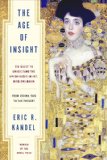
The Quest to Understand the Unconscious in Art, Mind, and Brain, from Vienna 1900 to the Present
by Eric Kandel
A brilliant book by Nobel Prize winner Eric R. Kandel, The Age of Insight takes us to Vienna 1900, where leaders in science, medicine, and art began a revolution that changed forever how we think about the human mind - our conscious and unconscious thoughts and emotions - and how mind and brain relate to art.
At the turn of the century, Vienna was the cultural capital of Europe. Artists and scientists met in glittering salons, where they freely exchanged ideas that led to revolutionary breakthroughs in psychology, brain science, literature, and art. Kandel takes us into the world of Vienna to trace, in rich and rewarding detail, the ideas and advances made then, and their enduring influence today.
The Vienna School of Medicine led the way with its realization that truth lies hidden beneath the surface. That principle infused Viennese culture and strongly influenced the other pioneers of Vienna 1900. Sigmund Freud shocked the world with his insights into how our everyday unconscious aggressive and erotic desires are repressed and disguised in symbols, dreams, and behavior. Arthur Schnitzler revealed women's unconscious sexuality in his novels through his innovative use of the interior monologue. Gustav Klimt, Oscar Kokoschka, and Egon Schiele created startlingly evocative and honest portraits that expressed unconscious lust, desire, anxiety, and the fear of death.
Kandel tells the story of how these pioneers - Freud, Schnitzler, Klimt, Kokoschka, and Schiele - inspired by the Vienna School of Medicine, in turn influenced the founders of the Vienna School of Art History to ask pivotal questions such as What does the viewer bring to a work of art? How does the beholder respond to it? These questions prompted new and ongoing discoveries in psychology and brain biology, leading to revelations about how we see and perceive, how we think and feel, and how we respond to and create works of art. Kandel, one of the leading scientific thinkers of our time, places these five innovators in the context of today's cutting-edge science and gives us a new understanding of the modernist art of Klimt, Kokoschka, and Schiele, as well as the school of thought of Freud and Schnitzler. Reinvigorating the intellectual enquiry that began in Vienna 1900, The Age of Insight is a wonderfully written, superbly researched, and beautifully illustrated book that also provides a foundation for future work in neuroscience and the humanities. It is an extraordinary book from an international leader in neuroscience and intellectual history.
"Starred Review. A transformative work that joins the hands of Art and Science and makes them acknowledge their close kinship." - Kirkus Reviews
"Starred Review. Kandel, who won the Nobel Prize in Medicine for his work in finding the physical location of memory within neurons, here uses neuroscience to take on the creative mind. The result is a fascinating synthesis of art, history, and science that is also accessible to the general reader. A distinctive and important title that is also a pleasure to read; highly recommended to even the occasional reader of serious nonfiction." - Library Journal
"Eric Kandel's training as a psychiatrist and his vast knowledge of how the brain works enrich this thoroughly original exploration of the relationship between the birth of psychoanalysis, Austrian Expressionism, and Modernism in Vienna." - Margaret Livingstone, Professor of Neurobiology, Harvard Medical School
This information about The Age of Insight was first featured
in "The BookBrowse Review" - BookBrowse's membership magazine, and in our weekly "Publishing This Week" newsletter. Publication information is for the USA, and (unless stated otherwise) represents the first print edition. The reviews are necessarily limited to those that were available to us ahead of publication. If you are the publisher or author and feel that they do not properly reflect the range of media opinion now available, send us a message with the mainstream reviews that you would like to see added.
Any "Author Information" displayed below reflects the author's biography at the time this particular book was published.
Eric R. Kandel is University Professor and Kavli Professor at Columbia University and a Senior Investigator at the Howard Hughes Medical Institute. Kandel is founding director of the Center for Neurobiology and Behavior at the College of Physicians and Surgeons of Columbia University, and recipient of the 2000 Nobel Prize in Physiology or Medicine for his work on memory storage in the brain. He is the author of In Search of Memory, a memoir that won a Los Angeles Times Book Award, and co-author of Principles of Neural Science, the standard textbook in the field. He was born in Vienna and lives in New York with his wife, Denise.




There is no such thing as a moral or immoral book. Books are either well written or badly written. That is all.
Click Here to find out who said this, as well as discovering other famous literary quotes!
Your guide toexceptional books
BookBrowse seeks out and recommends the best in contemporary fiction and nonfiction—books that not only engage and entertain but also deepen our understanding of ourselves and the world around us.